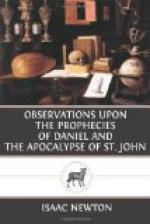It may relate chiefly to the worship of
Jupiter
Olympius in his Temple built by the Emperor
Hadrian,
in the place of the Temple of the
Jews, and
to the revolt of the
Jews under
Barchochab
occasioned thereby, and to the desolation of
Judea
which followed thereupon; all the
Jews, being
thenceforward banished
Judea upon pain of death.
Then I heard, saith [8]
Daniel, one saint
speaking, and another saint said unto that certain
saint which spake, How long shall be the vision concerning
the daily sacrifice, and the transgression of desolation,
to give both the sanctuary and the host to be trodden
under foot? And he said unto me, Unto two thousand
and three hundred days; then shall the sanctuary be
cleansed. Daniel’s days are years;
and these years may perhaps be reckoned either from
the destruction of the Temple by the
Romans
in the reign of
Vespasian, or from the pollution
of the Sanctuary by the worship of
Jupiter Olympius,
or from the desolation of
Judea made in the
end of the
Jewish war by the banishment of
all the
Jews out of their own country, or from
some other period which time will discover. Henceforward
the last horn of the Goat continued mighty under the
Romans, till the reign of
Constantine
the great and his sons: and then by the division
of the
Roman Empire between the
Greek
and
Latin Emperors, it separated from the
Latins,
and became the
Greek Empire alone, but yet under
the dominion of a
Roman family; and at present
it is mighty under the dominion of the
Turks.
This last horn is by some taken for Antiochus Epiphanes,
but not very judiciously. A horn of a Beast is
never taken for a single person: it always signifies
a new kingdom, and the kingdom of Antiochus
was an old one. Antiochus reigned over one
of the four horns, and the little horn was a fifth
under its proper kings. This horn was at first
a little one, and waxed exceeding great, but so did
not Antiochus. It is described great above
all the former horns, and so was not Antiochus.
His kingdom on the contrary was weak, and tributary
to the Romans, and he did not enlarge it.
The horn was a King of fierce countenance, and destroyed
wonderfully, and prospered and practised; that
is, he prospered in his practises against the holy
people: but Antiochus was frighted out
of Egypt by a mere message of the Romans,
and afterwards routed and baffled by the Jews.
The horn was mighty by another’s power, Antiochus
acted by his own. The horn stood up against the
Prince of the Host of heaven, the Prince of Princes;
and this is the character not of Antiochus
but of Antichrist. The horn cast down the
Sanctuary to the ground, and so did not Antiochus;
he left it standing. The Sanctuary and Host were




